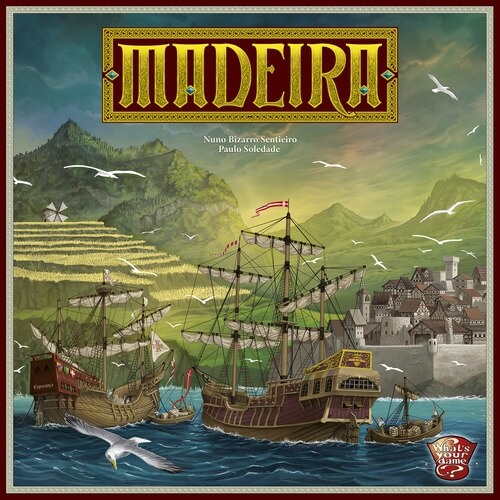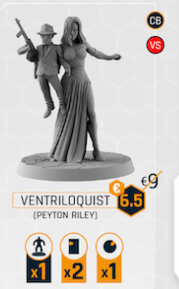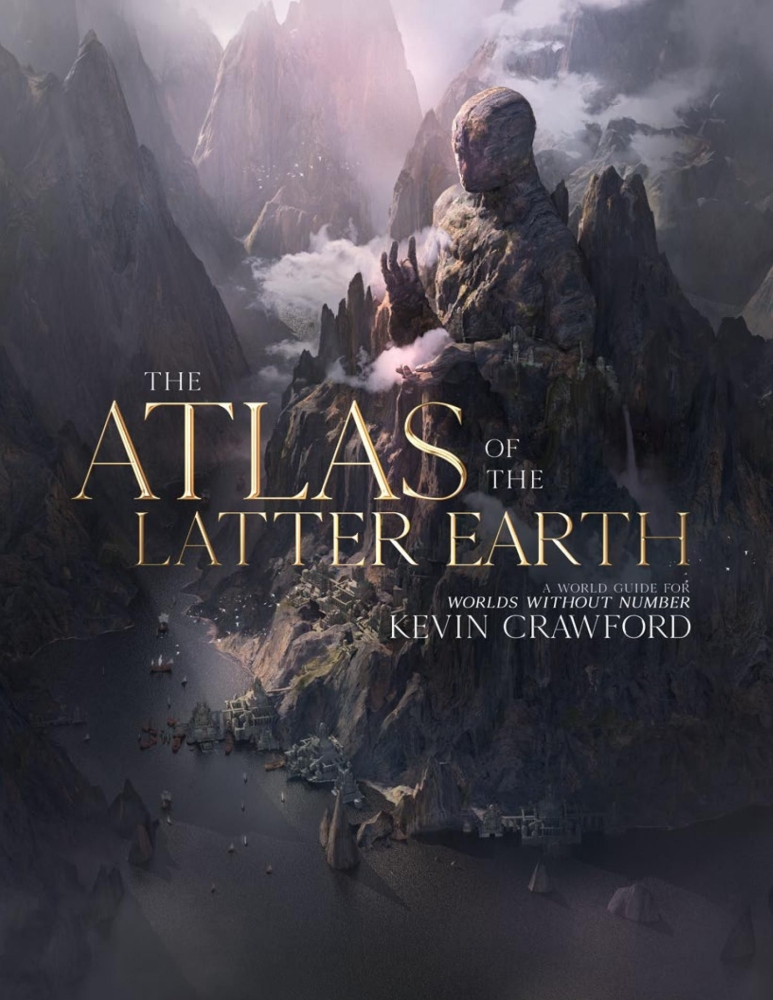
Madeira
Madeira is a complex strategy game that takes players back to the time of the great navigations, set on the Portuguese island of the same name. Throughout the game, players take on the role of rulers who seek to prosper on the island, developing the local economy and gaining privileges from the Portuguese Crown. Players face a dynamic set of challenges as they try to optimize their agricultural and manufacturing production, starting with the traditional wheat plantations and moving on to the production of the iconic Madeira wine. To succeed, it is essential to manage limited resources, such as wood, which is crucial for building new structures and ships that will facilitate trade with distant markets. One of the game's innovations is the dice mechanics that interact with the Guilds and the Army, allowing players to access strategic captaincies and hire influential characters. These characters housed in important buildings on the island offer different skills and advantages, but also involve costs that need to be carefully considered. Each round, the King assigns essential tasks, such as settlements and expeditions, and players must select which ones to carry out, balancing risks and rewards. Decisive moments occur when the King assesses progress, awarding privilege points that can be decisive for the outcome of the game. The pressure increases as the scarcity of resources and the growing threat of piracy can affect players' plans, generating an environment of intense competition. In Madeira, every choice counts, and players will need cunning and strategy to stand out and ensure the prosperity of their region before others take the lead. Are you ready to face the island's challenges and leave your mark on the history of the Portuguese Empire?Artists: Mariano Iannelli;
Designers: Nuno Bizarro Sentieiro; Paulo Soledade
Date: 2013
Note: 8.1
Mechanics: Allocation of workers, Allocation of Data Workers, Influence / Majority in the Area, Shift Order: Based on Statistics, Shift order: Passing order, Data Scrolling
Topics: Adventure, Economy / Production
Table of Contents
- How to Play
- Tips for playing
- Game mechanics
- Game components
- Additional Information
OBJECTIVE OF THE GAME
Tips for playing
Here are some tips for doing better in the game Madeira:
- Pay attention to construction contracts to optimize your wood production.
- Prioritize the purchase of technologies that improve the efficiency of your sawmills.
- Make good use of workers in different areas to maximize resource production.
- Follow the fluctuations in supply and demand to sell wood at the best time.
- Expanding early to new islands can increase your resource opportunities.
- Make sure your warehouses have enough capacity to avoid wasting wood.
- Negotiate with other players to gain strategic advantages in the market.
Video about the game
GAME mechanics
- Worker allocation: In Wood, players have a pool of workers who can be allocated to different areas of the board to carry out specific actions. Each location offers different benefits, such as collecting resources, constructing buildings or training characters. The strategy lies in choosing the right time and place to maximize the workers' effectiveness and block the opponents' actions.
- Rolling dice: The game uses dice to determine production and other random events. Rolls are made at specific times, influencing the amount of wood players can harvest or affecting other actions in the game. The results of the dice may require adjusting strategies based on the probabilities and unpredictable events that occur.
- Allocation of Data Workers: It combines the allocation of workers with the element of dice rolling. In this system, the number or face of the dice can impact the effectiveness of the allocated workers, adding a layer of uncertainty and requiring planning to mitigate risks.
- Influence / Majority in the Area: Players compete for control in certain areas of the board, where having a majority of workers or influence tokens can guarantee significant bonuses. Gaining a majority in strategic regions can make the difference between victory and defeat, making movement and resource allocation decisive.
- Shift order: Based on statistics: Players' turn order can be determined by their accumulated statistics, such as resources, influence or other progress markers. This mechanism allows players with more effective or balanced strategies to act first in subsequent rounds, creating constant competition for statistical improvements.
- Shift order: Passing order: Alternatively, the turn order can be determined by the order in which players pass during a round. The first to pass in the current round will be the first to act in the next, encouraging players to carefully consider their action time and the strategic impact of passing early or late. This creates a dilemma between maximizing actions in the current round and securing an advantage in the next.
Game components
See all the items in the game below Madeira:
- 1 Game Board
- 4 Character pieces
- 2 Guild boards (with different sides for 2, 3 and 4 players)
- 12 Guild data
- 3 Pirate Dice
- 72 Items (Wine, Sugar and Wheat)
- 40 Wood
- 24 loaves
- 48 Workers (12 of each of the 4 players' colors)
- 24 Boats (6 of each of the 4 player colors)
- 40 Gold Coins
- 40 Pirate tokens
- 12 Neutral Citizens
- 12 Guild Favorites
- 8 King's Awards
- 12 Progress Discs (3 of each of the 4 player colors)
- 12 Square Action Markers (3 of each of the 4 player colors)
- 2 Round Overview Sheets
- 4 Crown Request initiatives
- 20 Requests from the Crown
- 1 Reference Sheet
Additional Information
- Ludopedia link: https://ludopedia.com.br/jogo/madeira
- Link Tabletopia:
- Amazon Brazil link: Comprar Madeira
- Amazon USA link: Comprar Madeira
Other games


